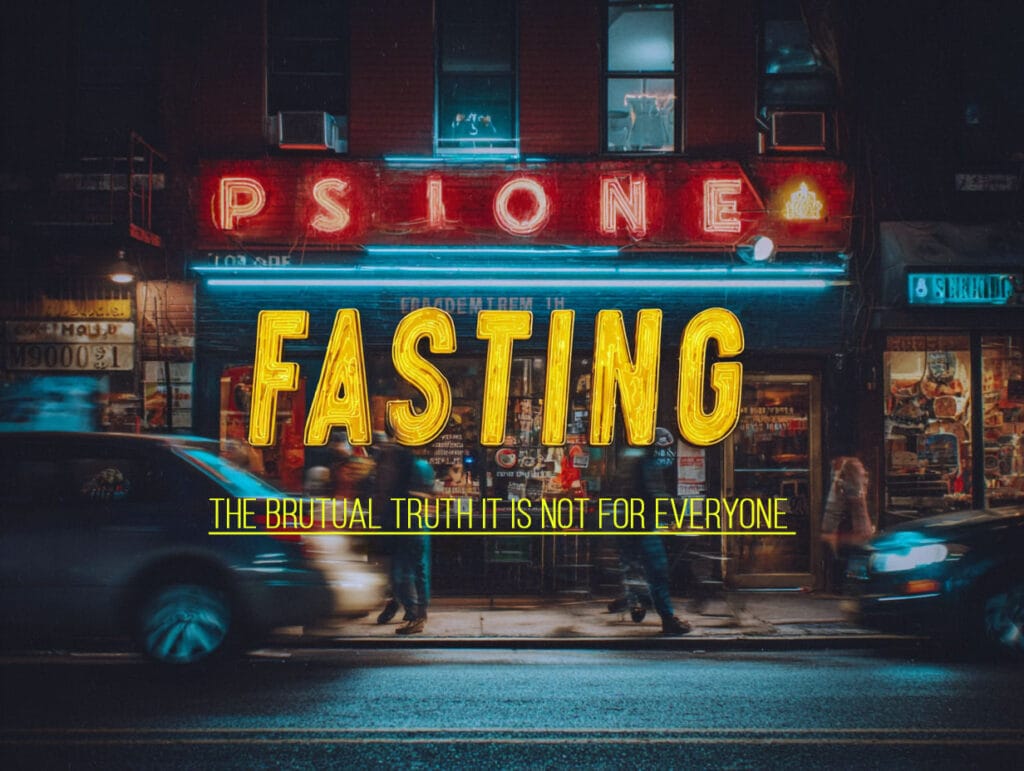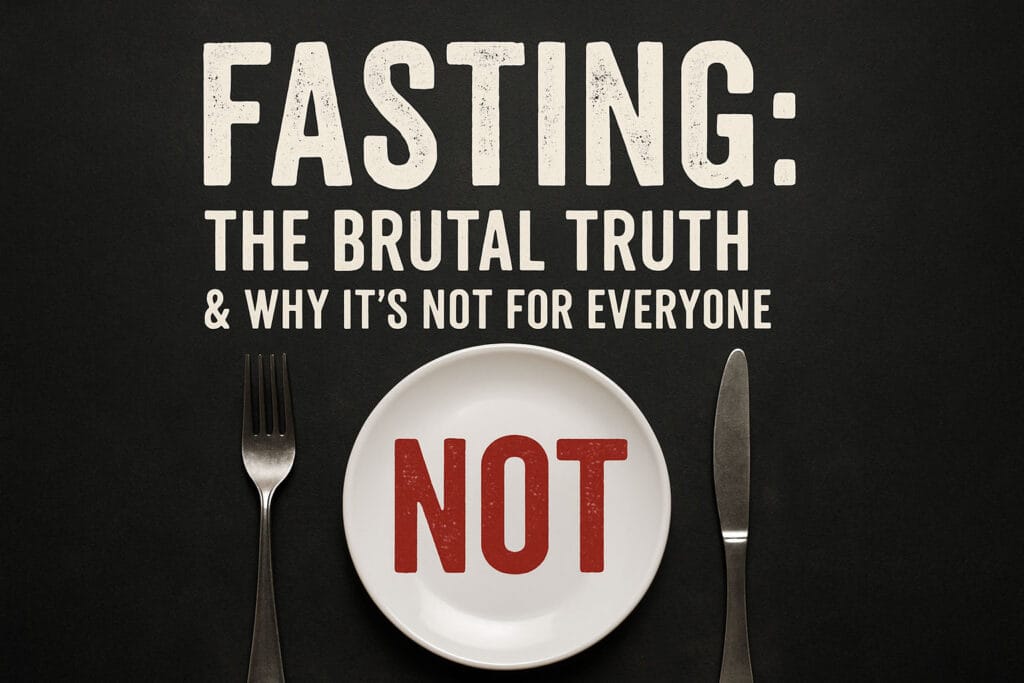
Fasting: The Brutal Truth & Why It’s NOT For Everyone
Alright, listen up. If you’re here looking for some fluffy, feel-good bollocks about how fasting is the magic bullet for all your problems, you’ve come to the wrong place. I’m Ian Callaghan, 57 years old, over a decade in the British Army, and I drank for 45 bloody years before I finally kicked that demon to the curb 8 months ago. That journey, that brutal rewiring of mind and body, taught me more about discipline, resilience, and what your body can really handle than any bloody textbook ever could. I’m a qualified coach, yeah, with the bits of paper in NLP, Reiki, nutrition, meditation, and hypnotherapy, but trust me, my real qualifications are etched in the scars and triumphs of my own life.
The amount of absolute shite I see online about fasting these days, particularly on TikTok and the shiny-filtered Instagram feeds, makes my blood boil. It’s all “lose weight fast!” and “glow up with this 24-hour cleanse!” without a single mention of the actual science, the real risks, or the simple fact that fasting stresses the body. And some of you, plain and simple, should never fast. End of story. I’ve got 40 years of experience as a qualified chef and nutritional diplomas, plus the lived experience of pushing my own body to its limits and back. This ain’t some AI-produced ebook, mate. This is real.
My Journey into Fasting: Discipline Forged in Fire
I didn’t start fasting because it was trendy. I started because, after quitting the booze, I needed to completely reset my system. My body was a wasteland, my mind a fog. I needed a tool to regain control, to feel sharp again, to strip away the years of accumulated crap. The discipline I learned in the Army, that ability to push through discomfort, came in handy.
I’ve experimented with various fasting techniques myself. I started with the classic 16-8, eating all my meals within an 8-hour window. It’s a decent entry point, helps you get used to not grazing all day. Then I moved onto OMAD – One Meal A Day. That’s a different beast, requiring more mental fortitude and careful nutritional planning for that one meal.
But the real game-changer for me, the one that really pushed my boundaries and delivered profound clarity, was the 72-hour water fast. And when I say water fast, I mean water with proper sea salt and lemon. Don’t just neck plain tap water for three days and expect to feel like a superhero. You’ll deplete your electrolytes faster than a politician loses credibility. Adding a pinch of good-quality sea salt (not your bog-standard table salt) and a squeeze of fresh lemon helps maintain those crucial electrolytes and makes it far more manageable. My own experience showed me that this approach helped with mental clarity and a feeling of bodily lightness I hadn’t felt in decades. It’s not a walk in the park, though. Those first 24-48 hours can be rough, but if you push through, the mental benefits are immense.
The Hows and Whys of Fasting (From My Perspective)
So, why bother with fasting? For me, it’s about more than just shedding a few pounds, though that’s often a welcome side effect.
- Metabolic Reset: When you stop eating, your body switches from burning glucose (sugar) to burning stored fat for energy. This is called metabolic switching, and it’s a powerful mechanism. It helps improve insulin sensitivity, which is crucial for overall health and preventing diseases like Type 2 diabetes. Studies suggest intermittent fasting can improve blood sugar management and reduce insulin resistance.
- Autophagy: This is a big one. It’s your body’s self-cleaning process, where it removes damaged cells and recycles cellular components. Think of it as your internal waste disposal system getting a kick-start. While the long-term effects still need more research, this cellular repair mechanism is a key benefit often cited for longevity and disease prevention.
- Mental Clarity and Focus: After the initial hunger pangs subside, I find my brain is sharper, my focus laser-like. It’s like the energy usually spent on digestion is redirected. This was particularly important for me in rebuilding my life after alcohol.
- Discipline and Self-Control: Honestly, this is huge. Learning to tell your body “no” when it screams for food builds mental resilience. It teaches you that hunger is often just a sensation, not an emergency. That internal dialogue, that mastery over impulse, is transferable to every other area of your life.
The Definite NOs to Fasting: Don’t Be a Bloody Idiot
Right, let’s get serious. Despite the supposed benefits, fasting is not for everyone. And I mean not for everyone. If you fall into any of these categories, you should absolutely, unequivocally, avoid fasting.
- Pregnant or Breastfeeding Women: Your body is growing and nourishing another human being. It needs consistent, robust nutrition, not stress. Fasting is generally considered unsafe during pregnancy and breastfeeding.
- Children and Teenagers: They are still growing and developing. Restricting calories or food intake can interfere with crucial developmental processes and lead to malnutrition.
- Individuals with a History of Eating Disorders: This is a massive red flag. Fasting can quickly trigger or exacerbate disordered eating patterns, leading to serious psychological and physical harm.
- Those with Type 1 Diabetes: Your body’s insulin regulation is already compromised. Fasting can lead to dangerously low blood sugar levels (hypoglycaemia) or ketoacidosis.
- People with Type 2 Diabetes on Certain Medications: If you’re on insulin, sulfonylureas, or meglitinides, fasting can be extremely dangerous due to the risk of blood sugar crashes.
- Underweight Individuals or Those with Malnutrition: Fasting will only worsen your condition and can lead to severe health complications.
- Elderly Individuals (without medical supervision): As we age, our bodies become more vulnerable to stress and nutrient deficiencies. Fasting, especially prolonged fasts, should be approached with extreme caution and professional guidance.
If you’re in any of these groups, forget the social media hype. Your health is not worth the risk.
Seek Medical Advice BEFORE You Fast: No Excuses
For some people, fasting might be possible, but it absolutely requires a conversation with your doctor first. Do not, I repeat, do not embark on any significant fasting regimen without consulting a healthcare professional if you have any of the following conditions:
- Chronic Medical Conditions (even if stable): This includes high blood pressure, heart disease, chronic kidney disease, and well-controlled Type 2 diabetes. Your doctor needs to assess if fasting is safe for you and how it might interact with your medications.
- Taking Medications that Impact Metabolism or Need to be Taken with Food: Many medications require food for proper absorption or to prevent gastrointestinal upset. Your doctor will need to advise on adjusting your medication schedule, if possible.
- History of Gout or High Uric Acid: Fasting can sometimes elevate uric acid levels, potentially triggering gout attacks.
- Active Peptic Ulcers: Fasting can exacerbate symptoms and increase the risk of complications.
- Cancer Patients Undergoing Treatment: Chemo and other treatments require significant nutritional support. Fasting can hinder recovery and immune function.
- Thyroid Conditions: Fasting can impact thyroid hormone production, so discussion with your doctor is essential.
Your physician can advise you on whether it’s safe to fast, how to adjust medication doses or schedules, and how to monitor your health condition during fasting. Don’t be a hero, be smart.

The Social Media Bollox: It’s All a Load of Shite
I’m telling you now that the perfect-looking twenty-something on TikTok telling you to ‘just push through’ a 72-hour fast without mentioning electrolytes, underlying health conditions, or the very real risks is talking absolute shite. They haven’t lived enough life, haven’t seen enough of the real world, and certainly haven’t battled the demons I have, or the daily grind many of you are facing. They’re selling a fantasy, often for clicks or quick cash from some garbage supplement.
Fasting is a tool, not a magic cure. It’s a powerful tool, but like any powerful tool, it needs to be used correctly, with respect, and with an understanding of its potential dangers. It’s not about looking good for an Instagram post; it’s about optimising your health, regaining control, and building genuine resilience.
Your Next Steps: No More Faffing About
If you’re serious about taking control of your health, about making a real change in your midlife, then stop faffing about with trends and start getting real.
- Assess Yourself Honestly: Are you in any of the “definite no” categories? If yes, then fasting is off the table. Full stop.
- Talk to Your Doctor: If you have any underlying conditions or take medications, get professional medical advice before you even think about starting.
- Start Small: If you’re cleared and want to explore fasting, don’t jump straight into a 72-hour water fast. Start with time-restricted eating, like 12-hour or 14-hour fasts, and see how your body responds.
- Prioritise Nutrition: When you do eat, make it count. Focus on whole, nutrient-dense foods. Don’t use fasting as an excuse to binge on crap during your eating window.
- Hydrate Properly: And I mean properly. Water, with added electrolytes (sea salt, lemon, or a good quality sugar-free electrolyte supplement), is crucial, especially during longer fasts.
- Listen to Your Body: If you feel genuinely unwell – dizzy, severe headaches, extreme fatigue – break the fast. It’s not a competition.
This midlife reset isn’t about quick fixes; it’s about building sustainable habits, mental fortitude, and a body that serves you, not the other way around. If you’re ready to cut through the noise and get down to brass tacks, come join my community. We’re about real people, real struggles, and real wins. No bullshit, just support and actionable advice.
Join the Midlife Reset community on Skool, and let’s get to work: Midlife Reset community on Skool.
And if you want more of my unfiltered thoughts, you can find me here: TikTok (@ian_callaghan)
Let’s make some real changes.
Want the No-BS Truth About Fasting?
If this post hit home, take it further with my ebook: The Brutal Truth About Fasting .
Straight talk. Myths busted. Risks exposed. No hype, just the truth.
👉 Grab the eBook
Amazing! Great information and science backed facts. Fasting is great for the body but as you’ve stated, not suitable for everyone. There is a lot of misinformation out there, especially on TikTok so thank you for sharing your expertise and experience. I usually do the rule of 16:8 sometimes 18:6 but I am going to try a 36 hour one, I’ve got my Celtic sea salt and Lemon ready to go.
Appreciate that, thank you 🙏 You’re spot on, there’s so much noise and nonsense around fasting online. Good to hear you’re already dialled in with 16:8 and 18:6. A 36-hour can be powerful, just listen to your body, stay hydrated, and keep that Celtic sea salt and lemon water flowing. Keep me posted on how you get on with it.